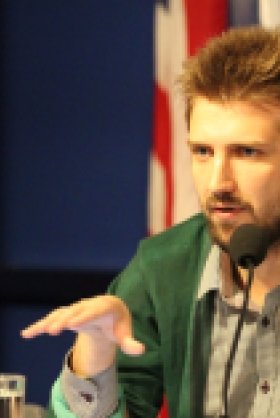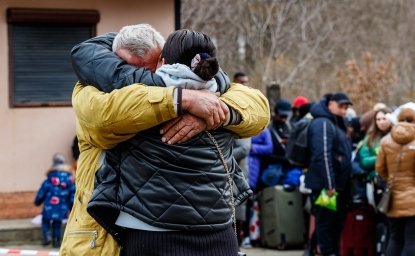The Future of Investigative Journalism in Russia


“We strive to get all the information to put together the full picture. All questions must be answered, and there shouldn’t be any holes in the story,” said Svetlana Reiter, freelance journalist for Bolshoi Gorod, among other magazines. At a 12 April conference at the Kennan Institute, five ground-breaking Russian journalists, including Reiter, discussed their experiences and offered insight into the future of investigative journalism in Russia.
Elena Milashina, Investigative Journalist for Novaya Gazeta, has worked on three important cases: the sinking of the Russian submarine, Kursk, in 2000; the 2002 Nord-Ost hostage crisis; and the Beslan hostage crisis in 2004. She stated that the official versions of these cases were intentionally falsified because they would have exposed the criminal neglect of the regime. Consequently, all three tragedies, among many others, never received full government investigations. Milashina explained that her task as an investigative journalist is to fill this void and uncover what really happened as well as who is responsible.
Elizaveta Osetinskaya, Editor-in-chief of the Russian edition of Forbes Magazine, said that the quality of Russian investigative journalism has increased remarkably over the past fifteen years. She explained that wider access to information made possible by the internet and the introduction of international brands of news organizations to Russian journalism were responsible for the development. The internet allows Russian journalists access to a variety of sources, and international news organizations have introduced high standards to Russian journalism. In spite of these developments, the current economic and political environment in Russia casts a dreary shadow on the future of Russian investigative journalism.
Osetinskaya warned that the main threat to Russian investigative journalism is a lack of financial resources and support, a challenge that threatens investigative journalism worldwide since the 2008 economic crisis. The need for sponsors, while often necessary to fund special investigative projects, can work against the independence of Russian investigative journalism because sponsors may impose censorship. News organizations and other media outlets openly funded by the government, such as the state-run television channel, NTV, may not be plagued with financial challenges, but are drowning in government control of content and have therefore lost their independence.
Svetlana Reiter noted a second challenge for Russian investigative journalism: that the field of journalism is plagued with “editor politics” that work against investigative reporting. She described her own experience with editors favoring shorter news snippets over lengthier investigative stories because they have greater appeal to their audiences. Ivan Ninenko, Deputy Director of Transparency International, Russia and co-anchor of the TV program, Korruptsiia na DOZHDE (Corruption on Rain), stated that this reflects a larger challenge: “the problem is to make people care.”
Reiter also discussed Russia’s political environment as a challenge to Russian investigative journalism. Reiter described how the political environment makes the collection of information difficult. She cited coverage of the protests in Bolotnaya Square as an example, noting that prosecutors pursued cases against protestors and dropped investigations of police brutality during the protests.
Ninenko described the difficulty of investigating high-level officials in Russia. He explained that corruption is rampant in Russia because “there are no forces in Russia trying to change the behavior of corrupt officials.”
The state of investigative journalism in Russia’s regions is sporadic and reflects the relation between political environment and investigative journalism. In some regions investigative journalism is thriving. In others, it is nonexistent. Ninenko explained that each region’s experience depends upon its relationship with the federal government: investigative journalism is largely successful in regions where there are weak ties between the regional and federal governments.
The panelists were concerned about the lack of training for new Russian journalists and discussed how challenges to Russian investigative journalism start in universities. Milashina explained that Russian journalists typically only receive a basic liberal arts education, leaving them unprepared for the field. Osetinskaya recommended greater access to international training programs to help prepare Russian journalists.
The panelists discussed the most salient challenge facing Russian investigative journalists today: their physical safety. Milashina noted that few cases of journalists’ deaths are investigated by the state. Even more unfortunate is that the information gathered about these murders by fellow journalists is rarely put to use and is often ignored by the authorities.
Nataliya Rostova, Senior Correspondent for Slon.ru, noted that the small number of Russian investigative journalists is reflective of the difficulty of the profession. Rostova explained that especially during the last presidential election in 2012, “the press was pushed not to touch on certain topics.” The failure to comply consistently resulted in the forced resignations of editors and journalists and fines handed out by Russian authorities. This environment has encouraged self-censorship among journalists and editors themselves.
It is difficult for true investigative journalism to survive under an authoritarian regime. Lack of open sources and frequent physical threats make operating in Russia challenging and demanding for Russian journalists. However, that challenge often serves as motivation in Russian journalists’ search for truth: “I can’t bring them to justice, but I can name them,” said Milashina, while reflecting upon her experience investigating crimes both committed and covered up by the regime
Mackensie Knorr
William Pomeranz, Acticing Director, Kennan Institute
Author

Kennan Institute
After more than 50 years as a vital part of the Wilson Center legacy, the Kennan Institute has become an independent think tank. You can find the current website for the Kennan Institute at kennaninstitute.org. Please look for future announcements about partnership activities between the Wilson Center and the Kennan Institute at Wilson Center Press Room. The Kennan Institute is the premier US center for advanced research on Eurasia and the oldest and largest regional program at the Woodrow Wilson International Center for Scholars. The Kennan Institute is committed to improving American understanding of Russia, Ukraine, Central Asia, the South Caucasus, and the surrounding region through research and exchange. Read more

Explore More
Browse Insights & Analysis
Russia’s Indigenous Communities and the War in Ukraine

Ukrainian Society Under Occupation: Hardship and Civic Resilience

